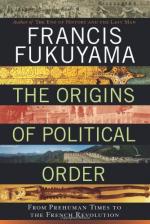|
This section contains 978 words (approx. 3 pages at 400 words per page) |

|
Part II, Chapters 10-13 Summary and Analysis
Chapter 10 is called "The Indian Detour." The history of India's early political development was very different than China's, Fukuyama explains. Both societies began with tribal organizations that gradually became territorial chiefdoms and states, but India did not experience the long periods of warfare that eventually drove China to develop a more centralized state. India also had a religious element, the Brahmins, that constrained the development of a strong central authority.
This Brahmanic religion explained the world in terms of a transcendent existence where a person was reincarnated after death. By following the proper laws and rituals, a person could be reincarnated in a better situation than his current life. These laws and rituals were dictated by the class of Brahmins, who were of the highest social level. Thus, in India law was not based in...
(read more from the Part II, Chapters 10-13 Summary)
|
This section contains 978 words (approx. 3 pages at 400 words per page) |

|




